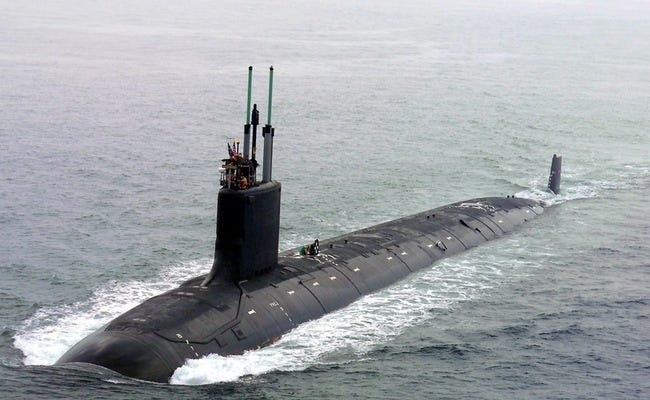Foreign experts commented on the creation of the AUKUS trilateral partnership
An interview with Penza News, Russia
Written by Alina Zaychikova (Translated from Russian)
October 8, 2021. PenzaNews. Controversial assessments were caused by the creation of a new security partnership AUKUS by Australia, Great Britain and the United States, which led to the termination of the defense contract between Canberra and Paris for the supply of 12 Barracuda-class attack submarines totaling more than 50 billion euros.
As part of the agreement, Australia, in particular, plans to build at least 8 nuclear submarines using American technology, as well as re-equip its armed forces with American cruise missiles. In Paris, Australia's decision was called a "stab in the back" and "undermining confidence" between the allies.
Chinese Foreign Ministry spokesman Zhao Lijian noted that the start of trilateral cooperation on nuclear submarines "grossly harms peace and stability in the region, aggravates the arms race, harms efforts under the international nuclear nonproliferation regime."
According to former German ambassador to the United Nations Christoph Heusgen, the emergence of the new alliance has led to a "great loss of confidence" in the administration of US President Joe Biden.
Meanwhile, Japanese Prime Minister Fumio Kishida expressed his approval for AUKUS, while Deputy Foreign Minister Sergei Ryabkov said that Russia has sent a number of questions to the United States in connection with the creation of the alliance and will ask them to colleagues from Australia and Great Britain. ...
Earlier, Australian Foreign Minister Marise Payne stated that the AUKUS partnership was created for the exchange of technology and is not a military or security alliance.
Analyzing the emergence of AUKUS and its development prospects, independent researcher Murray Hunter pointed out that the presented factual information about the new partnership is not enough to draw clear conclusions.
“There are very few details about AUKUS at this stage. Australian submarines will enter service no earlier than 10 years from now. [...] Today Australia has few opportunities to implement its own military projects, except for the maintenance of a few naval ships. [...] I see AUKUS rather as a revival of the ANZUS agreement, where the UK took the place of New Zealand, ”said the expert.
On paper, he said, AUKUS is not strategically important in the Indo-Pacific.
“To date, the only tangible problem is the decision to transfer nuclear submarines to Australia for a long-term lease by Washington and London, as well as their intention to provide Canberra with technologies for their construction,” Murray Hunter explained his vision of the situation.
At the same time, the prospects for the development of cooperation, in his opinion, remain unpredictable.
“It will completely depend on the next American president. In the coming years, it is unlikely that anything special will happen, other than conducting, for example, exercises. [...] In any case, AUKUS will not replace defense policy. This is not a political course, but only a reflection of undefined intentions, ”the analyst said.
He added that, in addition to the frustrations expressed by France against the backdrop of the emergence of AUKUS, there are "some side effects."
“Singapore is not happy with this idea, but generally agrees with it. Malaysia has expressed criticism, fearing that this agreement may contribute to an arms race in the region. Indonesia is the most critical: it reminded Australia of the need to abide by existing treaties, ”Murray Hunter clarified, stressing that the reaction in Southeast Asia cannot be called positive for Canberra.
In turn, visiting fellow at the Center for Strategic and Defense Studies at the Australian National University (ANU), Professor Clive Williams (Clive Williams) expressed the opinion that AUKUS was created to contain the growing military potential of China.
“The AUKUS agreement covers cooperation in the field of artificial intelligence, cyber warfare, weapon systems for submarine operations and long-range strikes. In addition, it will provide assistance for the establishment of auxiliary nuclear facilities, which are likely to be located near Adelaide in South Australia. AUKUS will focus on military capabilities, which will differentiate it from the Five Eyes intelligence alliance, which also includes New Zealand and Canada, ”the expert said.
“Under the agreement, the US and UK reaffirm their intention to help Australia develop and deploy nuclear submarines as Australia's primary contribution to AUKUS's military presence in the Indo-Pacific. Australian submarines will not carry nuclear weapons, but will likely carry conventional Tomahawk cruise missiles, ”added Clive Williams.
According to him, the deal represents a long-term security agreement between the three countries.
“Australia is expected to receive at least eight nuclear submarines. Over the next 18 months, Australia, the UK and the US will be planning further steps with the expected delivery of the first submarine in the 2040s. At the same time, Australia is considering the possibility of concluding a leasing agreement to familiarize the country's Royal Navy with operating nuclear submarines, ”the analyst said.
In his opinion, the prospects for the development of AUKUS will largely depend on the actions of China.
“The AUKUS Security Partnership should ensure that the US, UK and Australia are the dominant military players in the Indo-Pacific this century,” said Clive Williams.
Meanwhile, former US diplomat Grant Newsham called the AUKUS alliance good, both from a military-operational and political point of view.
“The exchange of nuclear submarine technology with Australia is an important agreement and a clear sign of a commitment to cooperation. But now the Americans, British and Australians need further swift action - more likely to get a couple of submarines to Australia, conduct exercises and prepare the infrastructure. You don't have to wait ten years. We need it now, ”the expert said.
He also stressed that AUKUS is not just a submarine deal.
“This agreement calls for cooperation in a number of areas, including artificial intelligence, advanced technologies and even missile systems. There are many other areas for cooperation, besides the issue of nuclear submarines, which attracts the most attention, ”said Grant Newsham.
“As for the French, they should have known that the agreements on submarines were on the verge of collapse. The agreement was like a connection with a mafia gang, squeezing huge sums of money from someone, unreasonable enough, who made a seemingly legitimate "deal." [...] Nevertheless, this issue should have been resolved more diplomatically, ”the expert said, stressing that the Joe Biden administration showed unprofessionalism in this situation.
In his opinion, the USA will need additional efforts to convince its partners of its own serious intentions for cooperation, since “AUKUS alone is not enough yet”.
“How serious is the US in its intentions when Wall Street, The Boeing Company, Apple and other companies are pouring billions of dollars into the PRC and pleading with the administration not to anger the Chinese communists? Allowing Huawei's chief executive, Meng Wanzhou, to go unpunished [her release was the result of a deal negotiated after lengthy negotiations between Chinese and American diplomats] would undermine AUKUS more than one might imagine. All the Chinese need to do is shout, threaten and hit the table - then the Americans are ready to retreat, ”the ex-diplomat explained.
Meanwhile, Buckingham University professor Anthony Glees said the new submarines would allow Canberra to monitor Chinese movements in the Indo-Pacific without being noticed.
“This has been negotiated with the United States and Australia for many months, perhaps since December 2019 or even earlier, and of course it was done secretly behind the back of Paris, despite the fact that France had a contract to build diesel submarines. with Australia. In addition, unlike Great Britain, France is in fact territorially an Asia-Pacific power and has always been a close strategic partner of Great Britain, perhaps sometimes even closer than the United States, ”the expert said.
In his opinion, the exclusion of France from the discussion was a serious strategic mistake of Great Britain and US President Joe Biden, who, apparently, did not focus on the consequences of a deliberate violation of the agreements with Paris.
At the same time, Anthony Glees recalled that, according to British National Security Advisor Sir Stephen Lovegrove, AUKUS has realized “the most significant cooperation potential in the world in the last decade”, which means that it is indeed a significant deal, which represents much more than just a one and a half year partnership.
“In my opinion, and he [British Prime Minister Boris Johnson] actually intends to make this a big project to start rebuilding Britain as a global, not a European power,” the expert added.
He also did not rule out that the agreement may contain clauses that have not yet been announced publicly.
“It is possible that Australia will agree to build a harbor for the UK's nuclear submarine fleet, or even that Australia may have some kind of access to UK nuclear weapons, which, however, is difficult to achieve without violating nuclear limitation treaties,” said Anthony Glees.
Originally published in Penza News 8th October 2021 https://penzanews.ru/analysis/150152-2021
You can subscribe for free emails of future articles here:
Alina Zaychikova Journalist, editor, translator at PenzaNews






